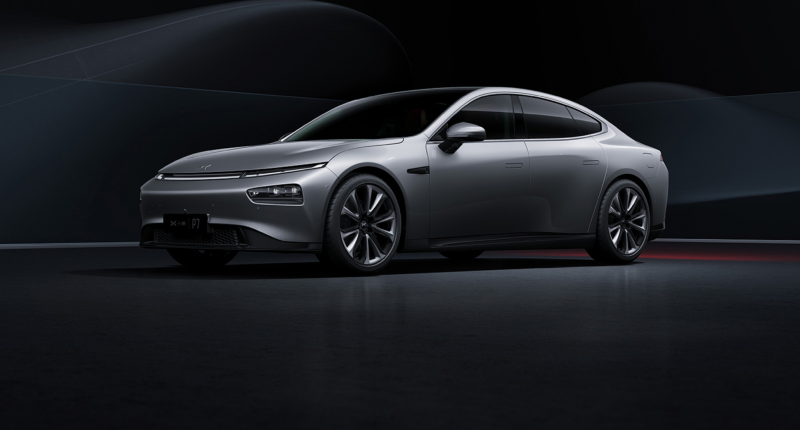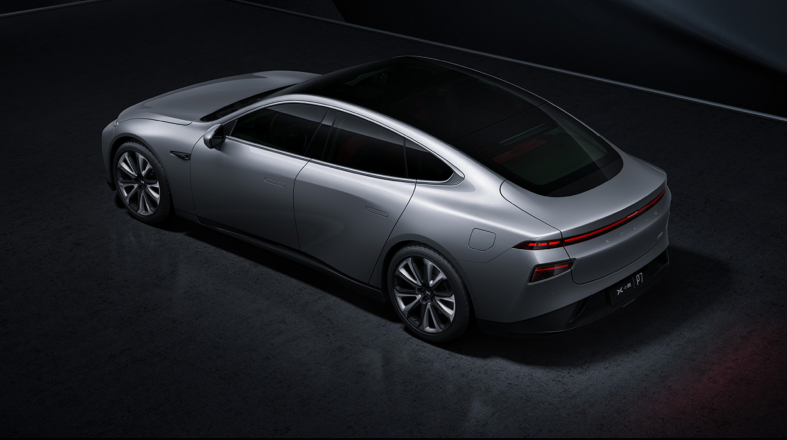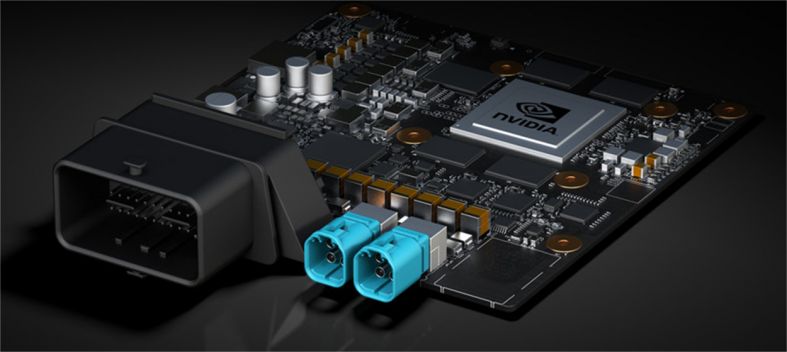The Xpeng Motors P7 Sedan With NVIDIA's AI-Powered DRIVE AGX Hardware Goes on Sale in China This Month
【Summary】Chinese electric vehicle startup Xpeng Motors, announced this week that its latest vehicle the P7 smart electric sports sedan will officially roll out in China on April 27. The P7 is the company’s first EV powered by the NVIDIA DRIVE AGX platform, which features Nvidia’s high-performance, energy-efficient Xavier system-on-a-chip (SoC).

Chinese electric vehicle startup Xpeng Motors, announced this week that its latest vehicle the P7 smart electric sports sedan will officially roll out in China on April 27. The P7 is the company's second electric vehicle, following Xpeng's G3 SUV, which was launched in December 2018.
The electric sedan was first unveiled a year ago. It's a fully-electric four-door sedan loaded with advanced technology. The car features an all-wheel-drive setup using dual electric motors.
The Ministry of Industry and Information Technology of China (MIIT) verified that the Xpeng P7's driving range reached 706km NEDC, which makes it the longest range EV in China.
The P7 slightly resembles a Tesla Model S, its closest competitor in China. The car features a low silhouette and smooth surfaces, including concealed door handles. Other features include a panoramic glass roof and minimalistic interior.
Xpeng is focused on offering its advanced electric vehicles for about half the price of a Tesla model in China. The all-wheel-drive longer range Tesla Model S starts at 793,000 yuan (US$112,240) in China. The P7 starts at 240,000 yuan (US$33,931) for the base model and goes up to 370,00 yuan (US$53,210) depending on the options.
"Our visually stunning and technologically groundbreaking models like the P7 demonstrate our determination and commitment to accelerate the development of smart mobility." said He Xiaopeng, Xpeng Motors Chairman & CEO, during the unveiling last year.

Nvidia's DRIVE AGX Platform
The P7 also stands out as one of the first Chinese electric vehicles being built for future autonomous driving. The electric car features the Nvidia DRIVE AGX Xavier platform for Xpeng's autonomous driving system it calls XPILOT. The P7 will run Xpeng's XPILOT 3.0, the company's latest version of the advanced automated driving software.
The Xpeng P7 is the company's first EV powered by the new DRIVE AGX platform, which features Nvidia's high-performance, energy-efficient Xavier system-on-a-chip (SoC). Nvidia's Xavier SoC is a powerhouse, delivering 30 TOPS (trillions of operations per second) of performance while consuming just 30 watts of power.
Nvidia is a leading developer of hardware development for autonomous vehicles around the world, due to the robust processing capabilities of its SoCs.
Nvidia's DRIVE AGX platform is a scable, open platform that serves as the AI "brain" of a self-driving vehicle. The company's Xavier is the first production-level SoC dedicated to supporting highly automated and autonomous driving functions. The P7 is packed with sensors and other hardware for automated driving.
The P7 is equipped with 12 ultrasonic sensors, five high-precision millimeter-wave radars, 13 autonomous driving cameras, plus one in-car camera with HD map and high-precision positioning. The P7 will bring several autonomous driving features to Chinese customers for the first time, including Level 3 autonomous driving functions for highways, urban roads and valet parking.
Level 3 autonomous systems are those which can perform most driving functions, such as automatic lane changing on highways, however it still requires a human backup in certain situations. These systems alert the driver to intervene when it encounters a situation it cannot navigate.
"Consumers in China will soon have access to Xpeng's smart, highly automated EVs, which are backed by the processing power, efficiency, safety and scalability of NVIDIA Xavier," said Rishi Dhall, vice president of autonomous vehicles at NVIDIA. "We're also working closely with Xpeng on its next-generation intelligent EV roadmap to bolster their autonomous capabilities."

Nvidia's Xavier SoC delivers 30 TOPS (trillions of operations per second) of performance while consuming just 30 watts of power.
Nvidia has made it easier for automakers like Xpeng to develop their self-driving cars.
The California chipmaker provides the auto industry access to its NVIDIA DRIVE pre-trained deep neural networks (DNNs) for autonomous vehicle development on the Nvidia GPU Cloud (NGC) container registry.
Xpeng is using NVIDIA Xavier's Deep Learning Accelerators for AI inference used in Level 3 operation.
The P7 further leverages NVIDIA's AI-powered hardware for development of Xpeng's own self-driving deep neural networks. Using a suite of Nvidia's AI tools, developers can freely extend and customize the models to increase the performance of their own self-driving systems.
The open NVIDIA DRIVE OS enables Xpeng to run its proprietary autonomous driving software. Nvidia's drive OS is upgradable and offers continual over-the-air updates critical for future autonomous driving capability advancements as they are introduced.
"Our successful collaboration with Nvidia was critical to the development and production of our P7," said Dr. Xinzhou Wu, vice president of autonomous driving at Xpeng. "Backed by the performance and energy efficiency of Xavier, we've been able to accelerate and outpace our peers in the creation of this safe, intelligent, feature-rich sedan--at a price point that makes it an ideal solution in today's highly competitive EV market."
"We are very excited to expand our collaboration with Nvidia for our next-gen EV production model, which will offer more competitive, user-friendly and safer autonomous driving features to a broader customer base," added Wu.
Xpeng Motors is also actively exploring potential opportunities for adopting Nvidia's latest Orin platform for its future generation of smart EVs, given its strong architectural compatibility with the Xavier platform.
Xpeng Motors recently received a renewed Autonomous Vehicles Testing Permit from the California Department of Motor Vehicles (DMV), joining around 60 other companies with the permit, including Waymo, Uber and Tesla and many other global automakers. The permit allows Xpeng to test its autonomous driving technology on public roads in the state.
Xpeng announced in November 2019 its US $400 million Series C capital funding from a group of strategic and institutional investors. Alongside its leading strategic investor Alibaba Corporation, Xiaomi Corporation has joined as a new strategic investor.
-

Electric Nissan Juke: A Sneak Peek at the Future
-

Electric cars set to become more affordable
-

Major creditor in talks to acquire Volta Trucks
-

Chinese EV maker's valuation close to Tesla
-

EVs' Limited Success in the U.S., Excluding Teslas
-

Toyota's Dedication to Quality Shines in Century Bolt Tightening Process
-

Tragic Accident: Bentley's Speed Questioned in Niagara Falls Deaths
-

Accelerating Car Development with Mazda-backed AI Firm
- BorgWarner Invests $500 Million in Wolfspeed Inc, a Developer of Semiconductors and Silicon Carbide Devices for Electric Vehicles
- China Added 963,000 Electric Vehicle Charging Piles Since January in its Push to Lead the World in EV Sales
- Ford Raises the Prices of the F-150 Lightning Electric Pickup Due to Rising Raw Material Costs
- Ford Announces the Largest Utility Agreement in the U.S. History to Assemble All of its Vehicles in Michigan Using 100% Renewable Energy by 2025
- Struggling Electric Vehicle Startup Faraday Future Signs Deal to Raise up to $350 Million in Financing to Help it Stay Afloat
- Faraday Future Delays Launch of FF91 Electric SUV Again
- Volkswagen Group China Unveils its ‘Flying Tiger’ Electric Vertical Take-Off and Landing (eVTOL) Passenger Aircraft Prototype
- Sony, Honda Sign Agreement for Joint EV Brand
- 2023 Jeep Grand Cherokee Trailhawk Now PHEV Only
- Facing Rising Production Costs, Automakers Ford, GM, Stellantis and Toyota Urge Congress to Lift the Cap on the $7,500 EV Tax Credit



















 About Us
About Us Contact Us
Contact Us Careers
Careers